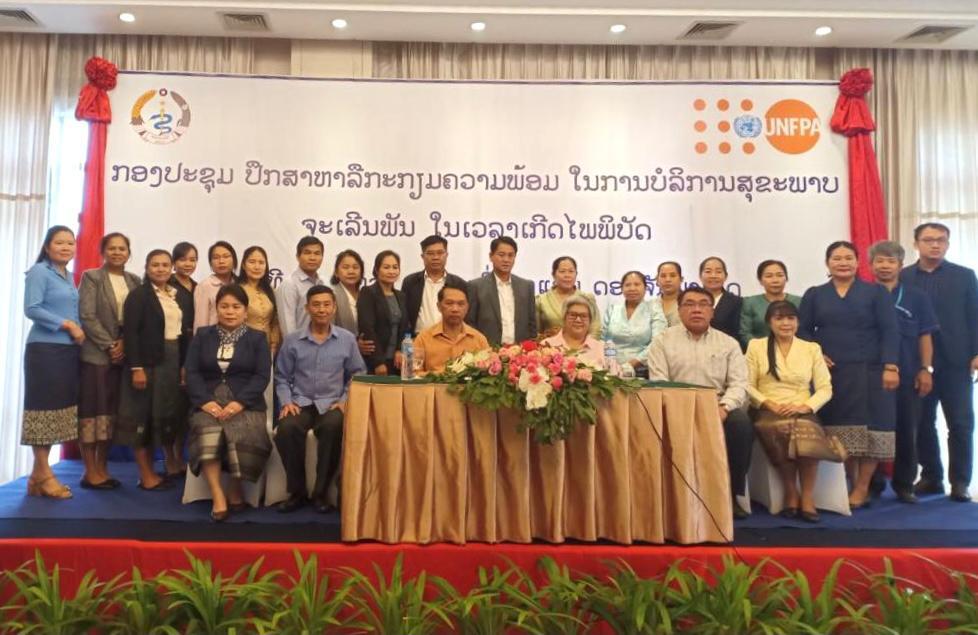16 December 2020, Vientiane Capital, Lao PDR – Ministry of Health with support of the United Nations in Lao PDR organised a one-day workshop to call on policy maker, programmers, and managers from the Ministry of Health, Ministry of Labour Social Welfare and Lao Women Union to intensify and coordinate efforts for the affected province and districts. The one-day advocacy meeting discussed the implementation of the Minimum Initial Service Package (MISP) for reproductive health in emergency situations and how to implement MISP in the early phase of emergency. The audience included participants from central level and 3 provinces: Savannakhet, Luang Prabang and Attapeu.
The meeting covered MISP’s 6 main objectives: 1. Coordination Saves Lives; 2. Prevent sexual violence & respond to the needs of survivors; 3. Prevent the transmission of & reduce morbidity & mortality due to HIV & other STIs; 4. Prevent excess maternal & newborn morbidity & mortality; 5. Prevent unintended pregnancies and Objective 6. Plan for comprehensive SRH services, integrated into primary health care as soon as possible including Safe Abortion Care to the full extent of the law.
Heavy rainfall caused by different Tropical Storm in 2018, 2019 and 2020 have caused devastating flooding in the provinces of Attapeu, Savanhnakhet, Khammouane, Xayabouli, Bolikhamxay, Luangprabang, Bokeo, Sekong, Xiengkhoang and Oudomxay. This series is the most severe Laos has seen in the past ten years. Additionally to this natural disaster, COVID-19 impact came to weaken the situation of women, youth and the most marginalized.
Sexual and reproductive health services and needs are always severely affected during disasters put women at higher risk of sexual violence, expose youth to Sexually Transmitted Infections and HIV transmission, childbirth during evacuation and displacement with an increasing rate and access to emergency obstetric care and family planning remains limited, leading to maternal deaths and unwanted pregnancies.
“With climate change and other natural disasters that affect the world including Laos, we need to be better prepared, and have a better system in place within the health sector to support our women and girls” Said Dr. Phonepaseuth Ounaphom, Director General, Department of Hygiene and Health Promotion, Ministry of Health.
Sexual and Reproductive Health (SRH) is vital in humanitarian settings, and can be considered as a lifesaving intervention. The MISP is not just kits of equipment and supplies; it is a set of activities that must be implemented in a coordinated manner by appropriately trained staff.
“We hope that after the workshop, health sector will be invested and supported to appropriately implement MISP preparedness and response to future disasters and can manage the cases of survivors of sexual violence, among adults and children, in their areas of work” Sai d by UNFPA in Lao PDR, Ms Siriphone Sally Sakulku.
The meeting also discussed the integration of MISP into the next Disaster Management and Response plan to adapt its implementation to the local context for improved preparedness and response to disasters and pandemics in order to continue providing the essential Reproductive Maternal Newborn, Child and Adolescent Health services. The outcome of this meeting will be shared at the health sector national disaster management review and planning 2021 meeting from 17 to 18 December 2020 in Thalat.
For more information, please contact:
Ms Oulayvanh Sayarath,
Health System Strengthening Programme Analyst
Email: sayarath@unfpa.org
************
UNFPA, the UN's sexual and reproductive health agency, works in over 150 countries including Lao PDR, to achieve zero maternal deaths, zero unmet need for family planning and zero gender-based


